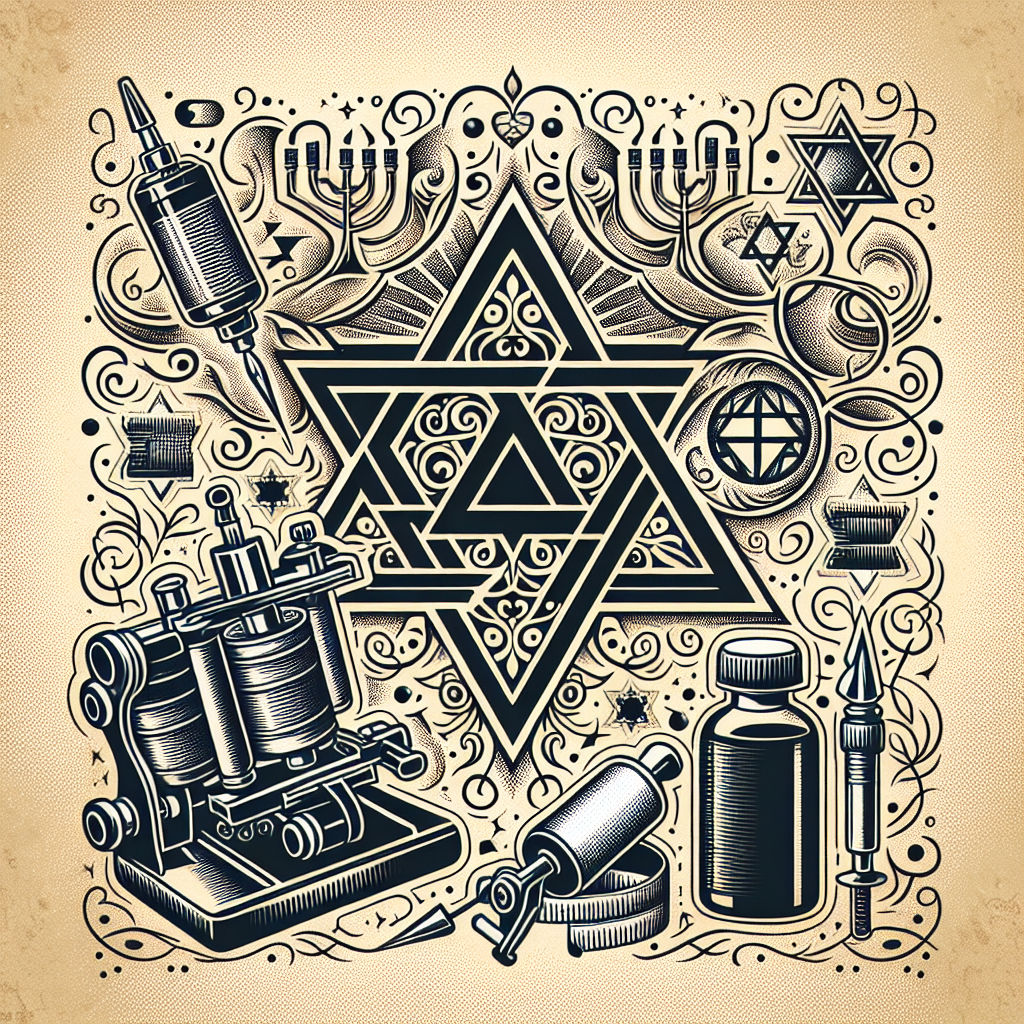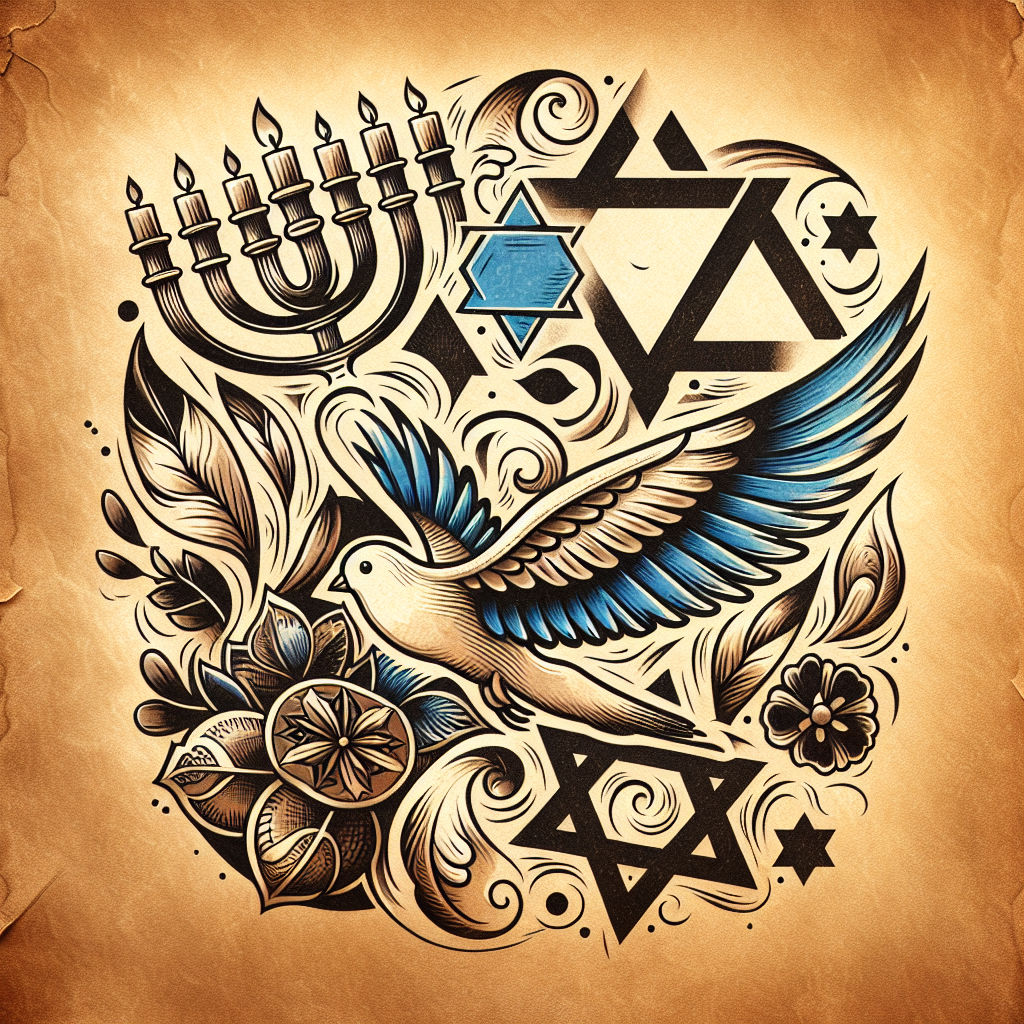“How to Choose a Jewish Tattoo: Tips and Advice”
Introduction to Jewish Tattoos
Tattoos have been a form of expression across various cultures for thousands of years, and the Jewish community is no exception. The history of Jewish tattoos is complex, with its roots intertwined with cultural significance and religious law. In ancient times, tattoos were often associated with idolatry and pagan rituals, which led to a strong aversion within the Jewish faith. However, the Holocaust marked a dark period where tattoos were forcibly inked onto the bodies of Jews as a means of dehumanization and identification in concentration camps. This tragic association has had a lasting impact on the Jewish perception of tattoos.
In modern times, perspectives on tattoos within the Jewish community have evolved. While traditional views still largely prevail, there is a growing acceptance among some Jews who see tattoos as a form of personal expression or as a way to honor their heritage. This shift is particularly evident among younger generations and those who identify as culturally Jewish rather than strictly religious. Tattoos featuring Jewish symbols, Hebrew text, or other meaningful designs are becoming more common, reflecting a nuanced relationship between contemporary Jewish identity and the ancient art of tattooing.
Understanding Jewish Law and Tattoos
The primary source of Jewish law, the Torah, contains a verse in Leviticus 19:28 that states, “You shall not make gashes in your flesh for the dead, or incise any marks on yourselves: I am the Lord.” This directive has been traditionally interpreted as a prohibition against tattoos, linking the practice to pagan mourning rituals. The Talmud, a central text of Rabbinic Judaism, further reinforces this interpretation, suggesting that tattoos defile the body, which is considered to be created in the image of God.
Contemporary rabbis and Jewish authorities continue to debate the interpretation of this law. Orthodox Judaism generally maintains a strict stance against tattoos, viewing them as a violation of Halacha (Jewish law). Conservative and Reform movements, while not encouraging tattoos, often adopt a more lenient approach, recognizing the diversity of modern Jewish experiences and the personal nature of such decisions.
Some rabbis argue that the context of the biblical prohibition is key, suggesting that it specifically targets idolatrous practices rather than the act of tattooing itself. This has opened the door for some Jews to reconcile their tattoos with their faith, especially when the tattoos are expressions of Jewish pride or remembrance.
Symbolism and Meaning in Jewish Tattoos
Jewish tattoos often carry deep symbolism and meaning, serving as a connection to one’s faith, culture, or history. Common symbols include the Star of David, which represents the connection between God and the Jewish people; the Chai, which means “life” in Hebrew and symbolizes the value of life in Jewish culture; and the Hamsa, a protective amulet against the evil eye.
Incorporating Hebrew text into tattoos is another way Jews connect with their heritage. Phrases from the Torah, names of loved ones, or significant words like “Shalom” (peace) or “Ahava” (love) are popular choices. However, it’s crucial to understand the implications of using Hebrew script, as it is a sacred language in Judaism. Ensuring correct spelling and context is essential to avoid disrespecting religious texts or inadvertently creating offensive or nonsensical tattoos.
The decision to get a tattoo with Jewish themes is often laden with personal significance. For some, it’s a form of remembrance for those lost in the Holocaust, turning a symbol of oppression into one of survival and resilience. For others, it’s a declaration of identity in a world where Jewish heritage can sometimes feel under threat.
In conclusion, the relationship between Judaism and tattoos is multifaceted and evolving. While traditional Jewish law largely prohibits tattoos, modern interpretations and changing attitudes have allowed for a more diverse expression of Jewish identity through body art. Symbols and Hebrew text carry profound meanings, and those choosing to get Jewish tattoos often do so with a deep sense of connection to their heritage. As the conversation continues, it’s clear that tattoos will remain a topic of significance within the Jewish community, reflecting the dynamic nature of cultural and religious identity.

Choosing the Right Design
When it comes to tattoos, the design you choose is not just a reflection of your personal taste but also a representation of your identity and beliefs. For members of the Jewish community, selecting a tattoo design can be a profound way to connect with their heritage. However, it’s essential to approach this decision with sensitivity and awareness to avoid cultural insensitivity or appropriation.
The personal significance of a tattoo design cannot be overstated. For many Jews, a tattoo might serve as a permanent reminder of their faith, a commemoration of their cultural history, or a tribute to loved ones. Common symbols include the Star of David, which represents the connection between God and humanity, and the Chai, symbolizing life and often associated with the numerical value 18, a number traditionally considered to bring good luck in Jewish culture.
Incorporating Hebrew text into tattoos is another popular choice. Whether it’s a meaningful quote from the Torah, a name, or a significant word, it’s crucial to ensure the accuracy of the Hebrew script. Misinterpretations or misspellings can lead to unintended meanings and can be disrespectful to the language and culture. Consulting with a Hebrew-speaking individual or a knowledgeable rabbi before finalizing the design is a wise step.
While expressing one’s Jewish identity through tattoos can be empowering, it’s important to avoid designs that may be culturally insensitive or appropriative. This includes avoiding sacred texts that are not meant to be depicted on the body or symbols that may have been used in a historical context that could evoke painful memories, such as Holocaust-related imagery.
The choice of a tattoo design should be a thoughtful process, one that involves a deep understanding of the symbol’s origins and meanings. It’s also advisable to consider how the design might be perceived within the broader Jewish community and whether it aligns with the values and traditions that are important to you.
Placement Considerations
The placement of a tattoo is a significant decision that can affect not only the aesthetics of the design but also its impact on daily Jewish life. Traditional Jewish law, or Halacha, has long held taboos against tattooing, stemming from interpretations of Leviticus 19:28, which prohibits the marking of one’s body. While modern attitudes towards tattoos within the Jewish community have become more diverse, placement considerations remain important.
For those who wish to honor traditional taboos, choosing a discreet placement that can be easily covered may be preferable. This allows individuals to maintain a sense of privacy and respect for more conservative family members or community spaces, such as synagogues or Jewish events, where tattoos might be frowned upon.
Visibility is another crucial factor. A highly visible tattoo may lead to conversations or judgments that could impact professional relationships or social interactions within the Jewish community. It’s essential to weigh the desire for self-expression against the potential implications of where the tattoo is placed on the body.
Moreover, some Jews might consider the implications of tattoos on rituals such as burial. There is a common myth that having a tattoo can prevent one from being buried in a Jewish cemetery. While this is not universally true, as practices vary among different communities, it is a consideration that some take into account when deciding on tattoo placement.
Finding a Tattoo Artist Familiar with Jewish Themes
The importance of choosing a tattoo artist who is not only skilled but also respectful and knowledgeable about Jewish themes cannot be overstated. A tattoo is a collaboration between the artist and the client, and when it comes to culturally significant designs, the artist’s understanding of the symbolism is crucial.
When researching potential artists, it’s beneficial to review their portfolios for experience with Jewish themes or symbols. An artist familiar with the cultural significance can provide valuable insights into the design process and ensure that the final product is both aesthetically pleasing and culturally respectful.
Additionally, artists who are experienced with Jewish-themed tattoos may also be more aware of the nuances of Hebrew script, which is particularly important to avoid errors in text-based designs. They might also offer guidance on appropriate imagery and help steer clients away from potentially offensive or inappropriate choices.
It’s also worth considering the artist’s approach to the tattooing environment. For some Jews, ensuring that the tattooing process aligns with kosher practices may be important. While the ink and equipment used in tattooing are not traditionally considered in terms of kosher laws, some may seek an artist who respects their desire for a process that feels in harmony with their religious practices.
In conclusion, when it comes to Jewish tattoos, the design, placement, and choice of artist are all deeply personal decisions that require careful consideration. By choosing a design with personal and cultural significance, considering the implications of tattoo placement, and selecting an artist familiar with Jewish themes, individuals can honor their heritage while expressing their unique identity. As the perspectives on tattoos within the Jewish community continue to evolve, these choices reflect a broader conversation about tradition, modernity, and personal expression.

Pre-Tattoo Discussions with Family and Community
When considering getting a tattoo, especially one that reflects one’s Jewish heritage, it’s important to recognize the potential impact such a decision can have on family dynamics and community relations. The Jewish community is diverse, with varying degrees of observance and opinions on religious law. Tattoos, historically taboo within Judaism, can stir up strong emotions and lead to significant discussions.
For many Jewish families, tattoos can be a source of concern due to their association with non-Jewish practices or their perceived defiance of traditional Jewish law. It’s not uncommon for older generations, in particular, to hold more conservative views on body modification. Engaging in open and respectful conversations with family members before getting a tattoo can help mitigate potential conflicts. It’s an opportunity to explain personal reasons for wanting a tattoo, how it reflects one’s identity, and the thought process behind the decision.
In these discussions, it’s beneficial to acknowledge the family’s concerns and demonstrate an understanding of the cultural and religious implications. Emphasizing the tattoo’s meaningfulness and its connection to Jewish heritage can sometimes help bridge the gap between personal expression and traditional values.
Community acceptance is another factor to consider. In some Jewish communities, having a visible tattoo might lead to judgments or a sense of alienation. It’s essential to gauge the temperament of one’s community and consider how a tattoo might affect one’s role within it. While some communities are more progressive and accepting of individual choices, others may have a more traditional stance that could influence social and religious interactions.
Navigating these discussions requires sensitivity and a willingness to understand different perspectives. It’s a personal journey that can lead to a deeper connection with one’s Jewish identity and a reaffirmation of the values that are most important to the individual.
Preparing for the Tattoo Process
The decision to get a tattoo is a significant one, with permanent implications. For those who observe Jewish dietary laws, the question of whether tattooing can be done in a kosher manner may arise. While the ink and the process itself are not ingested and therefore not subject to kashrut in the traditional sense, some may seek a tattoo artist who respects the cultural and religious significance of their tattoo.
Ensuring that the tattoo artist uses sterile equipment is paramount, not only for general health reasons but also as a reflection of the Jewish value of preserving one’s health. Additionally, some may prefer vegan inks, which do not contain animal byproducts, aligning with certain interpretations of kashrut and ethical considerations.
Understanding the commitment involved in getting a tattoo is crucial. It’s a permanent addition to one’s body, and for Jews, this can carry extra weight due to the historical and cultural context. It’s advisable to spend ample time reflecting on the design, its placement, and the motivations behind it. This introspection can help ensure that the tattoo will be a source of pride and personal significance for years to come.
Aftercare and Maintaining the Tattoo
Aftercare is an essential aspect of the tattoo process, as it ensures the longevity and beauty of the design, as well as the health of the skin. Proper aftercare is a way of honoring the body, which in Jewish thought, is often considered a vessel for the soul and thus should be treated with respect and care.
Following the tattoo artist’s aftercare instructions is critical. This typically includes keeping the tattoo clean, avoiding sun exposure, and applying ointment to aid in healing. Neglecting aftercare can lead to infections or a poorly healed tattoo, which not only compromises the aesthetic but also disrespects the time, effort, and cultural significance invested in the artwork.
Long-term considerations for skin health and ink preservation include moisturizing the tattooed area and protecting it from the sun’s UV rays, which can fade and damage the tattoo over time. Regular maintenance and touch-ups can keep the tattoo looking fresh and vibrant, reflecting the enduring nature of the wearer’s Jewish identity and the values it represents.
In conclusion, the journey to getting a Jewish-themed tattoo is multifaceted, involving not only personal reflection but also engagement with family and community. It requires preparation that respects both the sanctity of the body and the cultural significance of the symbols being inscribed. Aftercare is the final, ongoing step in this process, ensuring that the tattoo remains a source of pride and a testament to one’s heritage. As attitudes towards tattoos continue to evolve within the Jewish community, these considerations will remain an integral part of the conversation for those looking to express their identity through body art.

Reflecting on the Tattoo Journey and Jewish Identity
The decision to get a tattoo is a significant one for many, but for members of the Jewish community, it can carry additional weight due to historical, religious, and cultural implications. After the tattoo needle has settled, and the skin has healed, a period of reflection often follows. This introspective journey can shape one’s sense of self and place within the Jewish community, which may have evolving perspectives on the practice of tattooing.
For individuals who have chosen to express their Jewish identity through the art of tattooing, the aftermath is not just about physical care but also about emotional and spiritual introspection. The permanence of a tattoo can lead to a deeper connection with one’s heritage, prompting a renewed interest in Jewish traditions, history, and values. It can serve as a daily reminder of one’s roots and personal beliefs, potentially strengthening one’s commitment to their faith and cultural identity.
However, the journey post-tattoo does not exist in a vacuum. It unfolds within the broader context of family dynamics and community interactions. Family members, especially those from older generations, may have strong opinions about tattoos, influenced by traditional views or historical associations, such as the forced tattooing of Jews during the Holocaust. Navigating these familial waters requires sensitivity and open communication. It’s an opportunity to discuss the personal significance of the tattoo and to address any concerns or misconceptions.
Community acceptance is another aspect of the post-tattoo experience. While some Jewish communities have become more accepting of tattoos, others still hold fast to traditional taboos. The visibility of a tattoo can lead to judgments or questions about one’s religious observance, which can be challenging for the tattooed individual. It’s important for those with Jewish tattoos to prepare for these encounters and to consider them as opportunities for dialogue and education about the diversity of Jewish expression.
The reflection period also involves considering how the tattoo may impact one’s future. This includes both personal and professional realms, as tattoos can affect job prospects and social interactions. For those in the Jewish community, there may be additional considerations, such as participation in certain religious rituals or visits to traditional spaces where tattoos might be frowned upon.
As the Jewish community continues to evolve, so too do its perspectives on tattoos. Younger generations are often at the forefront of change, challenging old taboos and embracing new forms of expression. The presence of tattoos within the community can spark discussions about modernity, assimilation, and the ways in which Jewish law is interpreted in contemporary society.
In conclusion, the personal journey post-tattoo is a multifaceted one for Jewish individuals. It encompasses a range of emotions and considerations, from personal identity and family dynamics to community acceptance and future implications. As tattoos become more common, the Jewish community’s perspectives on them may continue to shift, reflecting broader changes in attitudes towards tradition and modernity. For those who have chosen to wear their Jewish heritage on their skin, the tattoo is not just an artistic statement but a living, evolving symbol of their identity and faith.